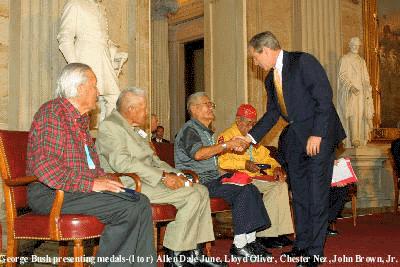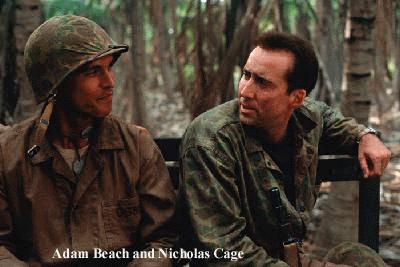|
|
Canku Ota |
|
|
(Many Paths) |
||
|
An Online Newsletter Celebrating Native America |
||
|
August 11, 2001 - Issue 42 |
||
|
|
||
|
Navajo Code Talkers Honored With Congressional Gold Medal /Movie to Depict War Era |
||
|
by Suzanne Westerly Photographer/Journalist |
 Washington, D.C. It was an emotional afternoon as
President George W. Bush presented the Congressional Gold Medal to four
of the five living Navajo (Diné) code-creators on Thursday, July
26, 2001. This is the highest civilian medal that can be given. During
World War II there were 29 Navajo code talkers who developed the unbreakable
military code, thus helping the United States win the war. Washington, D.C. It was an emotional afternoon as
President George W. Bush presented the Congressional Gold Medal to four
of the five living Navajo (Diné) code-creators on Thursday, July
26, 2001. This is the highest civilian medal that can be given. During
World War II there were 29 Navajo code talkers who developed the unbreakable
military code, thus helping the United States win the war.Following the award ceremony, MGM Studios hosted a reception at the Library of Congress in celebration of the code talkers and to publicly announce their soon-to-be-released epic motion picture Windtalkers, the first film to tell the story of the Navajo Marine code talkers' secret program of WWII. Senator Jeff Bingaman (D-NM) was the sponsor of the bill to award the medals. The honored code talkers present were Chester Nez of Albuquerque, NM, John Brown Jr. of Crystal, NM; Allen Dale June of West Valley City, Utah; and Lloyd Oliver of Phoenix, AZ. The fifth survivor, Joe Palmer of Leupp, AZ, is in poor health, but his son attended along with the families of the honorees. The families of the 25 other Navajo code talkers who are no longer living, or too ill to attend were there as well. Windtalkers' director John Woo, actors Nicolas Cage, Adam Beach, and Roger Willie enjoyed meeting the code talkers who made such a significant contribution to ending the war. It was 1942 when the 29 Navajo Marines were sent to boot camp at the Marine Recruit Depot in San Diego, California. From there, they were sent to Camp Elliot, now Air Station Miramar, to develop a military code based on the unwritten and extremely complex Diné language. Because the highly effective code was classified information for more than 20 years, the Navajo code talkers quietly kept their secret until the Pentagon declassified it in 1968. Now at last, their important efforts have been acknowledged and they have formally been given the thanks of this country. It is ironic that in the 1920's and 30's when these men were in boarding schools, they were forbidden from speaking their language. When asked to use it in the 40's to help their country during World War II, they felt proud to use the Diné language. About 400 Navajo men were trained to use the code and served as code talkers in the Pacific battles. According to a spokesperson at Senator Bingaman's office, there are 398 more code talkers who will receive the Congressional Silver Medal soon. Besides the Navajos, Comanches and Hopis were also codetalkers during WWII.  Windtalkers will be released on November 9, 2001. The film centers on the relationship between the code talkers and their fellow Marines during WWII¹s battles for the Central Pacific. In the film, Marines are assigned to each code talker to protect him and thus the code at all costs. The gripping climax takes place during the battle for Saipan, where the Marines must capture the island while at the same time ensuring the code talkers' security. Directed by John Woo, the film stars Nicolas Cage, with co-stars Adam Beach, Peter Stormare, Noah Emmerich, Mark Ruffalo, Brian Van Holt, Frances O¹Connor, Christian Slater and Roger Willie. Windtalkers was produced by John Woo, Terence Chang, Tracie Graham, and Alison Rosenzweig, from a script by John Rice and Joe Batteer. For the official website for Windtalkers click here. To view photos of the ceremony and of the original code talkers click here: Photo Gallery Suzanne Westerly Photographer / Writer 3860 Las Flores Canyon Malibu, California 90265 land phone - 310-317-6922 cell phone - 310-569-1644 WestWriter@earthlink.net |
|
|
| Related Links: |
|
Navajo Code Talkers-Senator Jeff
Bingam |
|
Photos courtesy of MGM Studios, BEI copywrite © 2001. |
|
|
|
|
||
|
|
||
| Canku Ota is a free Newsletter celebrating Native America, its traditions and accomplishments . We do not provide subscriber or visitor names to anyone. Some articles presented in Canku Ota may contain copyright material. We have received appropriate permissions for republishing any articles. Material appearing here is distributed without profit or monetary gain to those who have expressed an interest. This is in accordance with Title 17 U.S.C. section 107. | ||
|
Canku Ota is a copyright © 2000, 2001 of Vicki Lockard and Paul Barry. |
||
|
|
|
|
|
The "Canku Ota - A Newsletter Celebrating Native America" web site and its design is the |
||
|
Copyright © 1999, 2000, 2001 of Paul C. Barry. |
||
|
All Rights Reserved. |
||
